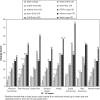A comparison of clinically important differences in health-related quality of life for patients with chronic lung disease, asthma, or heart disease
- PMID: 15762908
- PMCID: PMC1361158
- DOI: 10.1111/j.1475-6773.2005.00373.x
A comparison of clinically important differences in health-related quality of life for patients with chronic lung disease, asthma, or heart disease
Abstract
Objective: On the eight scales of the Medical Outcomes Study Short-Form 36-Item Health Survey (SF-36), Version 2, we compared the clinically important difference (CID) thresholds for change over time developed by three separate expert panels of physicians with experience in quality of life assessment among patients with chronic obstructive pulmonary disease (COPD), asthma, and heart disease.
Study design: We used a modified Delphi technique combined with a face-to-face panel meeting within each disease to organize and conduct the consensus process among the expert panelists, who were familiar with the assessment and evaluations of health-related quality of life (HRQL) measures among patients with the panel-specific disease.
Principal findings: Each of the expert panels first determined the magnitude of the smallest numerically possible change on each SF-36 scale, referred to as a state change, and then built their CIDs from this metric. All three panels attained consensus on the scale changes that constituted small, moderate, and large clinically important SF-36 change scores. The CIDs established by the heart disease panel were generally greater than the CIDs agreed on by the asthma and COPD panels.
Conclusions: These panel-derived thresholds reflect possible differences in disease management among the represented panel-specific diseases, and are all greater than the minimal CID thresholds previously developed for the SF-36 scales among patients with arthritis. If confirmed among patients with the relevant diseases and those patients' physicians, these disease-specific CIDs could assist both researchers and practicing clinicians in the use and interpretation of HRQL changes over time.
Figures
Comment in
-
Commentary--goodbye M(C)ID! Hello MID, where do you come from?Health Serv Res. 2005 Apr;40(2):593-7. doi: 10.1111/j.1475-6773.2005.00374.x. Health Serv Res. 2005. PMID: 15762909 Free PMC article. No abstract available.
Similar articles
-
Clinically important differences in health-related quality of life for patients with asthma: an expert consensus panel report.Ann Allergy Asthma Immunol. 2003 Aug;91(2):148-53. doi: 10.1016/S1081-1206(10)62169-2. Ann Allergy Asthma Immunol. 2003. PMID: 12952108 Review.
-
Triangulating patient and clinician perspectives on clinically important differences in health-related quality of life among patients with heart disease.Health Serv Res. 2007 Dec;42(6 Pt 1):2257-74; discussion 2294-323. doi: 10.1111/j.1475-6773.2007.00733.x. Health Serv Res. 2007. PMID: 17995565 Free PMC article.
-
Clinically important changes in health-related quality of life for patients with chronic obstructive pulmonary disease: an expert consensus panel report.J Gen Intern Med. 2003 Mar;18(3):196-202. doi: 10.1046/j.1525-1497.2003.20203.x. J Gen Intern Med. 2003. PMID: 12648251 Free PMC article. Review.
-
Clinically important differences in health status for patients with heart disease: an expert consensus panel report.Am Heart J. 2004 Apr;147(4):615-22. doi: 10.1016/j.ahj.2003.10.039. Am Heart J. 2004. PMID: 15077075 Review.
-
Measuring patient and clinician perspectives to evaluate change in health-related quality of life among patients with chronic obstructive pulmonary disease.J Gen Intern Med. 2007 Feb;22(2):161-70. doi: 10.1007/s11606-006-0063-6. J Gen Intern Med. 2007. PMID: 17356981 Free PMC article.
Cited by
-
Training general practitioners to improve evidence-based drug treatment of patients with heart failure: a cluster randomised controlled trial.Neth Heart J. 2020 Nov;28(11):604-612. doi: 10.1007/s12471-020-01487-x. Neth Heart J. 2020. PMID: 32997300 Free PMC article.
-
Incidence of Respiratory Syncytial Virus Infection in Older Adults Before and During the COVID-19 Pandemic.JAMA Netw Open. 2023 Jan 3;6(1):e2250634. doi: 10.1001/jamanetworkopen.2022.50634. JAMA Netw Open. 2023. PMID: 36662530 Free PMC article.
-
Early initiation of post-sternotomy cardiac rehabilitation exercise training (SCAR): study protocol for a randomised controlled trial and economic evaluation.BMJ Open. 2018 Mar 23;8(3):e019748. doi: 10.1136/bmjopen-2017-019748. BMJ Open. 2018. PMID: 29574443 Free PMC article. Clinical Trial.
-
Impact of intensive lifestyle intervention on depression and health-related quality of life in type 2 diabetes: the Look AHEAD Trial.Diabetes Care. 2014 Jun;37(6):1544-53. doi: 10.2337/dc13-1928. Diabetes Care. 2014. PMID: 24855155 Free PMC article. Clinical Trial.
-
Responsiveness and Minimally Important Differences for 4 Patient-Reported Outcomes Measurement Information System Short Forms: Physical Function, Pain Interference, Depression, and Anxiety in Knee Osteoarthritis.J Pain. 2017 Sep;18(9):1096-1110. doi: 10.1016/j.jpain.2017.05.001. Epub 2017 May 10. J Pain. 2017. PMID: 28501708 Free PMC article. Clinical Trial.
References
-
- Bellamy N, Buchanan WW, Esdaile JM, Fam AG, Kean WE, Thompson JM, Wells GA, Campbell J. “Ankylosing Spondylitis Antirheumatic Trials. III. Setting the Delta for Clinical Trials of Anti-Rheumatic Drugs–Results of a Consensus Development (Delphi) Exercise.”. Journal of Rheumatology. 1991;8:1716–22. - PubMed
-
- Brook R, Chassin M, Fink A, Solomon D, Kosecoff J, Park R. “A Method for the Detailed Assessment of the Appropriateness of Medical Technologies.”. International Journal of Technology Assessment in Health Care. 1986;2:53–63. - PubMed
-
- Centers for Medicare and Medicaid Services 2003. “Medicare Health Outcomes Survey Cohort III Performance Measurement Report” [accessed on June 21, 2004]. Available at http://www.cms.hhs.gov/surveys/hos/download/HOS_Sample-PMR_C3.pdf.
-
- Cohen J. Statistical Power Analysis for the Behavioral Sciences. New York: Academic Press; 1977.


